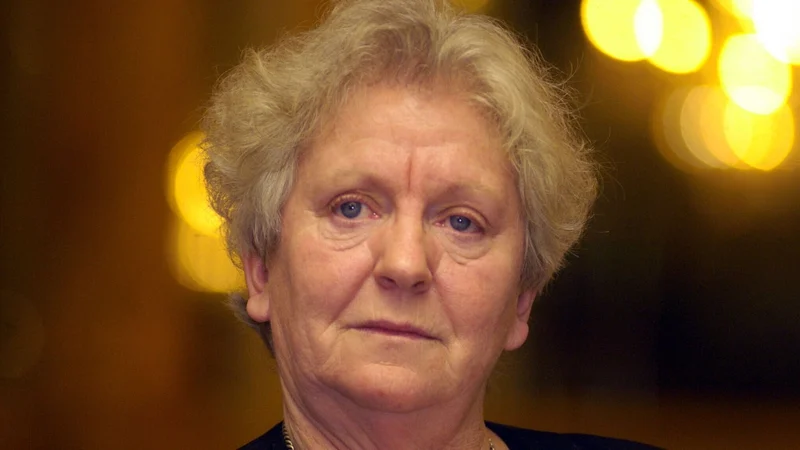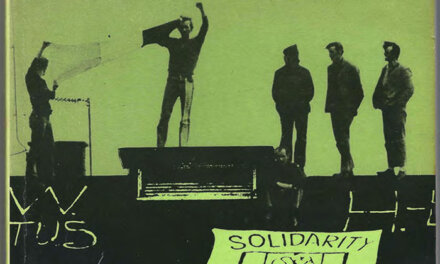News broke this morning that veteran activist and writer Nell McCafferty had died in her County Donegal nursing home. She was a founding member of the Irish Women’s Liberation Movement, a campaigning journalist and playwright. Nell was born in 1944 in the Bogside and although based much of her life in Dublin never forgot her Derry roots, nor the nationalist community’s experience under British rule in the North.
In 2006 she was asked to contribute to the Bobby Sands Trust’s book, Hunger Strike—Reflections, and below we reproduce the essay she wrote.
WHEN ALL THOUGHT FAILS
– Nell McCafferty, writer, activist
The three of us, friends for decades, fell in naturally together, amid a crowd of thousands. Though we all knew some members of the IRA, we were not IRA supporters. We had no time at all for the INLA. Yet, there we were, the three of us, grim-faced, and marching to the Long Tower chapel for the funeral obsequies of 26-year-old Patsy O’Hara of the INLA. It was the month of May.
Mary Holland, 47, had just bought a house in Dublin, to which she was moving from London. She had been sacked from her beloved Observer newspaper by the newly-appointed editor, Conor Cruise O’Brien. He did not like a profile she had written on Mary Nelis, who had gone round Europe, clad in a blanket, to raise awareness of the dirty strike in which her IRA son had been engaged for years in Long Kesh. Nelis of Sinn Féin had once been an SDLP supporter. Holland had traced, with sympathy and understanding, the change wrought in her political beliefs.
Michael, then 45, was, and is, an SDLP supporter. An architect with the Housing Executive, he had marched on Bloody Sunday against internment, and refused next day, along with thousands of civil servants, to engage in further work with the British army. Later, he refused to sign off contracts for some of the many housing estates then being built, because of lax financial controls. The estates were a welcome reponse to civil rights demands.
Michael was sacked, reinstated after colleagues downed tools, and his action vindicated after an inquiry that lasted years. His career never again reached the heights predicted for him. He kept the day job but poured his considerable energy and skills into the Inner City Trust, run by Paddy Bogside Doherty, which was responsible for preserving listed buildings within Derry’s Walls. (Doherty had been sacked from a building firm, after chairing the Citizens Defence Committee, during the Battle of Bogside, 1969.)
I was by then a 37-year-old freelance journalist, the Irish Times having declined to re-appoint me to a staff job which I’d resigned in 1978 to write the great failed novel. A weekly column which signaled my return to its pages in 1980 quickly collapsed when uproar within and without the paper greeted an article I had penned, suggesting that feminists had a moral obligation to support the demand for political status which underpinned the dirty strike of the Armagh Women.
The three of us, each in our own way, had paid a personal and financial price for our engagement with the North.
We all had a glancing acquaintance with Peggy O’Hara, mother of the dead Patsy. Who didn’t? She was glamorous and cheerful with long dark curling hair and dangling ear-rings. Patsy looked like her. She ran the cleanest public toilets in Derry, in Waterloo city centre, in the days when public toilets were marble emporiums. If you ran in there during a riot, she would make you a cup of tea. The toilets are closed now, and have been replaced by a group of statues made by Eamonn O’Doherty which commemorate the famine and emigration years.
I used to see Eamonn O’Doherty, who is from Derry, in a pub in the city of Dublin, to which he had gone for work, like myself, at the beginning of the seventies. He is a friend of Michael. In that pub one night Patsy O’Hara’s brother Tony was playing a guitar, as part of a folk group. He was on the run from the North. He was in good form.
I saw him in chapel, during the Mass for Patsy. He had returned to the North, been convicted of a paramilitary offence, gone on the blanket protest and been released for the day on compassionate leave. He looked awful, sweaty and sallow, with wild eyes and a beard. He was shaking all over. I hadn’t been into prison to see anyone since visiting the Armagh Women in 1980. One year on, and the sight of this young man shook me. What was happening in the prisons?
MY BOOK, The Armagh Women, had come out before the hunger strikers started to die, and was withdrawn after two weeks on foot of an uncontested libel suit by a former member of the Provisional IRA. The IRA had declined to intervene in the libel suit because, I was told, my book had not declared support for the Provisional IRA.
That’s the way the propaganda war was fought in 1981. If you did not laud the ‘heroism’ of the IRA, republicans held that you were against them. If you showed any understanding at all of why republicans fought, you were deemed by their opponents to be a supporter. So the book was pulped, a thing I always thought dreadful. (The man who sued me was looking to make a quick buck, he apologised to me, in the year 2000.)
THE THING I remember most about the march towards the chapel was the silence, the absence of humour, and the political incongruity of the huge gathering. There were no smiles, no bands, no loud hailer, no party political agreement. We were, if anything, puzzled, as we marched along, side by side. The simple solidarity of the civil rights movement had long since disappeared. We had wanted houses and votes way back then – such innocent stuff, it seemed in retrospect . The killing years had destroyed any illusion of innocence (though our ideal had always been the hardnosed objective of destroying the unionist stranglehold of the North.)
What were we doing then, marching in a show of solidarity with hunger strikers, all of whom were pledged to kill? Note that I do not write “pledged to murder.” That is because early on in the war in the North, I made a clear distinction between killing and murder. It is the job of armies of the state to kill, if necessary – Hiroshima, for instance. It is the job of paramilitaries, sometimes, to kill: when the law is unjust, the place of every just person is outside that law.
Ah, enough of that.
WE WERE silent on the day we marched behind Patsy O’Hara’s funeral because we did not know what to say, or what to do next. Horror silenced us. The one thing we were agreed on was that people like Patsy had not been born to kill, or raised to kill. That much we knew about each other in Derry. We were marching to show the world that we did not consider ourselves different from Patsy O’Hara. Or, rather, to show the world that Patsy O’Hara was no different than us. He was just like us, one of us, in all essential regards. We considered ourselves a decent people. We were not just sending a message to the British. We were flagging our feelings to the South.
We were in despair. Those were days without hope. Our only hope was to stand together.
We were astonished. Where did Patsy O’Hara get the courage to face a surely certain terrible death? How did that come out of the INLA, which so few supported, and most abhorred?
Of ALL the protests we had engaged in, his was the most peaceful of all. He had protested unto death with his body. Our puzzlement increased. We were marching in support of a man who had died for beliefs, objectives and paramilitary methods of attaining those objectives which we didn’t support.
It made no sense at all.
The only thing that made sense was that he was from Derry, was from us and of us, and was just like us in his belief in civil rights. He had chosen a different means of pursuing them after the unionist and British response to 1968, and especialy after Bloody Sunday. Bloody Sunday had changed us all. Were we retracing our steps, back to Bloody Sunday?
That would be too coherent an answer. There was no coherence that day. The only answer that made sense was silence: the silence of agreement. We were agreed that Patsy O’Hara was not a criminal and should have been given political status. The election of Bobby Sands, MP, just a month before, had seemed to us proof enough that nationalists believed that. The joyful shout of that vote had gone unheard, to our increasingly helpless disbelief.
I REMEMBER loads of silence during the days of the deaths of the ten hunger strikers. May day, May day, we were signalling during Patsy’s funeral. The night Bobby Sands died all you could hear as we walked in the dark was the sound of feet on the road in Derry. The afternoon that Francis Hughes died I was in a car going through Leenane, County Galway, en route to Westport in Mayo. The sun was shining. A newsflash broke into music on the radio. The other passengers in the car were from the South. I wanted to break silence to relieve the tension; the others waited for me to say something that would allow normal life to resume. The music jarred on our nerves. When we got to Westport I went off into a corner of the pub by myself, feeling conspicuous, a Northerner staying away from the feast. I did not know what else to do. Silence was best.
Politically, it was the loneliest time of my life. It took another seven years before I said publicly that I had come to the conclusion that the armed struggle was legitimate. Next day, the bomb went off at Enniskillen and I was metaphorically covered in the blood of Protestant civilians. I was immediately banned off RTE, of course.
I sat alone in the house for a week after that.
I sat alone, again, the day the IRA destroyed its arsenal in 2004.
I am sixty-two now, and heartglad the war is over. I still don’t understand Patsy O’Hara. I still don’t know what to say about him. Thank Christ I walked behind his coffin. Silence is eloquent, when all thought fails.





